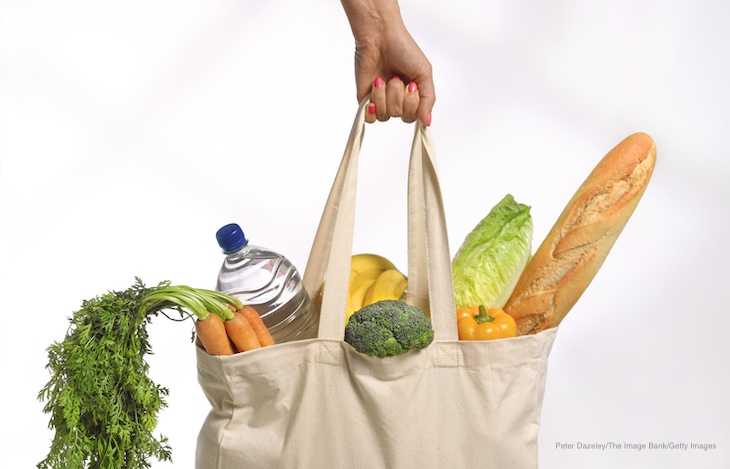Everyone is worried about coronavirus and wants to know how to protect themselves and their family. We all know about social distancing and washing our hands frequently. Food Poisoning Bulletin has also told you how to protect yourself when receiving packages and food deliveries at home. But how do you protect yourself against coronavirus when food shopping? Consumer Reports has some answers.

First, be aware that many grocery store chains and restaurants are offering delivery options and curbside pickup, which helps limit your exposure to others at this time. If you are picking things up, open the car door yourself. It’s best to avoid a direct hand-off; instruct the delivery person to put the groceries at your door or in your car. But if you have to go into a store to get food, here’s what you need to know.
First, try to shop at a less busy time. Take a hand sanitizer with you. Clean the handles of your shopping cart before you touch it. Most stores are offering sanitizer wipes, which aren’t as good as soap and water against the virus, but do help. Use a credit or debit card instead of cash.
Choose food as you usually do: buy undamaged produce, check use by dates on packaged food, and keep raw meats, poultry, fish, and eggs away from fresh produce. Don’t touch your face when shopping.
Coronavirus can live in cardboard for 24 hours, and on plastic and steel for up to 3 to 4 days. So when you get home, wash all nonporous containers. Wipe down cardboard boxes with sanitary wipes. Wash your hands and put the groceries away.
Then put the paper or plastic bags outside and clean your countertops and other surfaces that you have touched with soap and water. Wash your hands one more time with soap and water.
All fresh produce should be rinsed under running water. Scrub firm skinned produce with a brush, and rinse. And dry produce using a clean towel or paper towels. Drying produce with towels also helps remove some pathogens.
This is interesting: Consumer Reports says to wash produce with soap, which is against current FDA policy. They recommend soaking leafy greens in soapy water for 10 to 15 minutes, then thoroughly rinsing. Other experts say that consuming soap can make you sick. Whether you choose to do this or not, rinse and rinse and rinse these products. Soap easily destroys coronavirus since its outer layer is made of fat, but it’s not something you should eat.
There is no data that show that COVID-19 is spread by consuming food. Still, it’s best to reheat delivered food to 165°F, and to make sure all the food you prepare is heated to a safe final internal temperature. Coronavirus is destroyed at 136°F.
Follow these steps to protect yourself against coronavirus when food shopping and stay safe.





I typically spray fruits and veggies with vinegar. After a minute or so rinse. Is this adequate instead of soap?
Soap is the best way to destroy coronavirus, since it’s got a fat coating. Soap attaches to fat and then it rinses away. Vinegar won’t kill bacteria like E. coli or Salmonella. The FDA is still recommending just water rinsing. I’ll be watching to see if that changes.